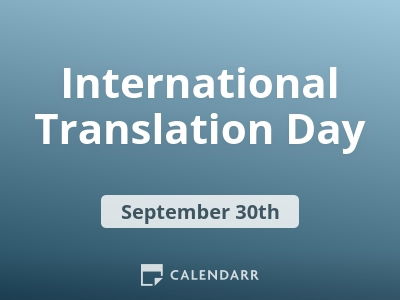- Calendar
- Calendar 2026
- September
- International Translation Day
International Translation Day
Every year on September 30, we celebrate International Translation Day to honor translators and language professionals.
From books to business deals, subtitles to legal documents, this day is all about recognizing the vital role translation plays in uniting people and making global communication possible.
Background
This date honors St. Jerome, the man who translated the Bible into Latin and is considered the patron saint of translators.
His work laid the foundation for translation as an important way to share knowledge across languages.
The day recognizes the essential role of translators and language experts in helping people understand each other across cultures.
The concept of this day came to light in 1952, when the FIT or International Federation of Translators actively promoted the work of translators.
FIT wanted the world to see how important translation is for international understanding.
In 1991, FIT officially launched International Translation Day to celebrate translators, interpreters, and language professionals who help connect people across language barriers.
A major step forward came in 2017, when the United Nations General Assembly passed a resolution to officially recognize September 30 as International Translation Day.
This showed the world that translation is not just helpful but necessary for peace, cooperation, and development around the globe.
Since then, the day has been celebrated with events, awareness campaigns, and annual themes that highlight the value of translation in our everyday lives.
This observance is a way to thank those who work behind the scenes to bring people and ideas together, showing how language continues to shape a more connected and inclusive world.
History of Translation
The history of translation goes back thousands of years.
One of the earliest known examples dates to around 2000 BCE, when parts of the Epic of Gilgamesh were translated from Sumerian into other ancient Mesopotamian languages.
These early efforts helped people from different regions share stories and ideas, even when they didn’t speak the same language.
Translation played a big role in religion, especially in ancient times.
Around the 3rd to 2nd century BCE, a group of scholars in Alexandria translated the Hebrew Bible into Greek.
This translation, known as the Septuagint, made religious texts more accessible and became a key reference for many later translations.
During the Middle Ages, translation helped preserve and spread important knowledge.
In Baghdad, the House of Wisdom became a major center for translating works from Greek, Sanskrit, and Persian into Arabic.
Meanwhile, in Toledo, Spain, scholars were translating Arabic and Hebrew texts into Latin. These efforts helped pass down science, philosophy, and medicine to Europe and sparked interest during the Renaissance.
The Renaissance and Reformation saw another big wave of translation, especially of religious texts.
Figures like Martin Luther translated the Bible into everyday languages, helping more people understand spiritual teachings.
These translations didn’t just spread religion, they also helped shape the modern forms of many languages.
In the 18th and 19th centuries, translation became more structured and professional. Scholars and writers focused on not just translating words, but also the meaning and tone behind them.
In China, Yan Fu introduced three core principles: faithfulness to the original, clarity in expression, and elegant style.
These ideas influenced how translators approached their work across cultures.
The 20th century brought major changes with the rise of technology. In 1954, the world saw its first public demonstration of machine translation, showing that computers could help with language tasks.
Later, tools like computer-assisted translation (CAT) and translation memory systems made work faster and more consistent for professionals.
Today, with AI and neural machine translation, tools like Google Translate and DeepL have made language access easier than ever.
These systems use deep learning to provide smoother, more accurate translations.
Still, human translators remain essential for capturing cultural meaning and emotional nuance.
From ancient tablets to artificial intelligence, translation has always played a vital role in connecting people, sharing knowledge, and building a more global and inclusive world.
Participating in this Day
There are many meaningful ways to participate in International Translation Day and honor the work of translators and language professionals who help bridge communication gaps worldwide.
One popular way to take part is by attending or organizing events such as webinars, workshops, or panel discussions. These gatherings often focus on the role of translation in global communication, literature, business, and diplomacy.
Schools and universities can also get involved by hosting language-themed activities or lectures that raise awareness about the importance of multilingualism and cultural understanding among students.
Social media is another great platform for participation. Sharing quotes, interesting facts, or personal experiences about translation using relevant hashtags can help spread awareness and appreciation across a wider audience.
For professionals in the field, this day is an opportunity to connect with fellow translators, reflect on their contributions, and explore new tools or trends in language services and technology.
Simple gestures also go a long way. Reading a translated book, supporting translator associations, or even personally thanking a translator are all meaningful ways to mark the occasion.
Whether through learning, sharing, or celebrating, every effort made on this day helps shine a light on the essential role of translation in creating a more connected, inclusive, and understanding world.

Other Celebrations
-
Apr 29 Wed
-
May 12 Tue
-
May 15 Fri
-
May 18 Mon
-
Jul 01 Wed
-
Aug 12 Wed

International Translation Day - Next years
Thursday, 30 September 2027
Saturday, 30 September 2028
Sunday, 30 September 2029











